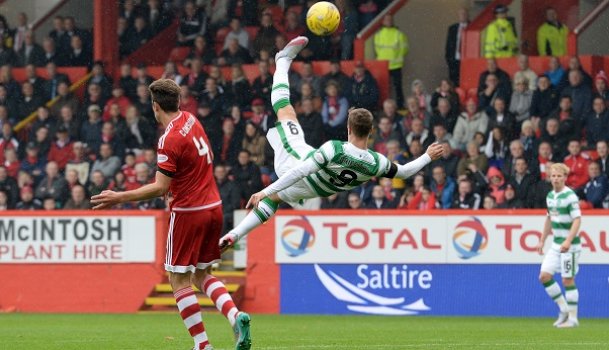Craig Cairns casts his eye over some of the weekend Ladbrokes Premiership games – with the spotlight on Pittodrie, Firhill and McDiarmid Park.
Changing line-ups, familiar patterns in Aberdeen v Celtic
The international break and closing of the transfer window made predicting the line-ups for this match difficult and, as a result, it was always going to throw up some interesting battles. Even so, with regards to the respective styles, familiar patterns emerged from the match’s major incidents.
Leigh Griffiths ran in behind the Aberdeen defence to latch on to a long Charlie Mulgrew through ball and win his side penalty, which he converted for his ninth goal of the season. Griffiths has been assisted by means of a through ball for three of those goals – seven of the nine have come from open play – and has won both his penalties after racing on to one. The striker almost equalised late in the game after getting behind the Aberdeen defence once more, though this time by way of a defensive error.
Celtic manager Ronny Deila resisted making too many changes in defence but fielded Tyler Blackett at left-back, responding to them being vulnerable to attacks down that side. The Manchester United loanee did his best to nullify the threat of Niall McGinn and it was on the other side that Aberdeen found the most joy. Jonny Hayes took advantage of the exposed Mikael Lustig to twice cut inside and look for the head of Kenny McLean. Celtic goalkeeper Craig Gordon saved spectacularly for one – although a foul had already been given – and McLean failed to connect with the other. Aberdeen have scored six of their 18 goals in all competitions this season through headers, McLean should have added to that tally.
Aberdeen levelled through a spot-kick of their own in the second half then continued to trouble Celtic’s right side. Lustig found himself on a caution – as did Stefan Johansen, playing in an unfamiliar role just ahead of the Swede – which led to Deila prepping Efe Ambrose on the sidelines to replace him. Before that could happen, Hayes got himself sent off for a lunge at Lustig. Instead of proving a turning point in Celtic’s favour, Aberdeen reshaped into a 4-4-1, with McGinn now on the left and, despite possessing a man advantage, it was Celtic’s vulnerability in that area that was to prove decisive.
With five minutes remaining, McGinn was brought down by Ambrose, who was also booked. From the resulting free-kick, the Northern Ireland international pitched the ball into the box for Paul Quinn to poke home and win the match. McGinn has been vital to Aberdeen’s success this season and already has three goals and five assists, playing a key role in two others.
The goal, and Aberdeen’s other chances, exposed Celtic’s weakness when defending crosses as well as Aberdeen’s strength in attacking with them. Going into this match, four of Aberdeen’s goals had come from set-pieces while a further nine goals have come as a result of getting the ball into the box from wide areas.

Thistle improve but lose to a Greg Stewart trademark
Robbie Muirhead found himself in Partick Thistle’s line-up after his loan move from Dundee United. Although starting on the right of the attack, Muirhead consistently took up central attacking positions when his side had possession and was a threat when they broke forward.
His movement opened up space for another new signing, the Sierra Leone international Mustapha Dumbuya, to attack from right-back. Some of Thistle’s success in recent seasons has been built upon attacking intent from the full-backs. Losing Aaron Taylor-Sinclair and, more recently, Stephen O’Donnell left Alan Archibald no choice but to address the issue. The more defensive Gary Miller started the season as first choice, but made way for Dumbuya on Saturday. Even from one performance it is obvious he is much more in the mould of O’Donnell, who finished the club’s second-top goalscorer and contributed to numerous attacks last season. Dumbuya was rewarded for his efforts when he was announced as the stadium sponsor’s man of the match.
Both teams looked threatening on the break but experienced differing frustrations. Whereas the home side got themselves into many great goalscoring positions, luck deserted them somewhat with no fewer than three of their efforts striking the frame of the goal. Dundee, on the other hand, won the ball in Thistle’s half on numerous occasion but, more often than not, failed to find a final pass or else get adequate support around Greg Stewart when he received the ball.
Their best opportunity of the first half fell to Nicky Low after he dispossessed Liam Lindsay just outside the Thistle box. Unfortunately for Low, he pulled his shot wide but it was a warning that Dundee had it in them to win the match if Archibald’s men didn’t take chances of their own.
It wasn’t until the introduction of Rory Loy that Dundee found the winner. He replaced Low, meaning that Stewart - who had started on the left before lining up more centrally when Ricky Calder was introduced - moved over to a more threatening position on the right. After collecting the ball just inside his own half, Stewart drove on before curling the ball past TomᚠÄŒerný.
Thistle had been pressing for a winner and found themselves dispossessed with players committed upfield. The quick turnover of possession and the presence of Loy alongside Kane Hemmings in attack created the space for Stewart to drive into the right channel, an area from where he has scored three of his four goals this season.
Stewart - or Loy - should have made the victory more comfortable late on but even so, in the end, the man who was playing part-time football little over two years ago has proved a matchwinner for Dundee once again.

Michael O’Halloran behind the newly-found potency at McDiarmid
Steven MacLean rightly grabbed the headlines after Saturday’s 4-1 win over Hamilton, but it is the form of Michael O’Halloran that has been the most consistent in the St Johnstone ranks. He got his fifth assist of the season when he fired in a low cross from the right-hand side for MacLean’s second. Interestingly, each one of the former Scotland U21 international’s assists have come from low balls into the box from the right. Furthermore, half of St Johnstone’s 14 league goals have been assisted from that side.
After their four goals, St Johnstone are now the third-highest scoring team in the league with 13, scoring one more than Aberdeen and two less than Hearts. Their up and down start to the season can be explained by them conceding the third-highest amount of goals, also 13. St Johnstone are self-confessed slow starters but now have a number of key players back from injury and are quickly climbing the table. In the past, this has been built upon a solid backline and low-scoring victories. This season they appear to have added more goals at both ends.





.png)












